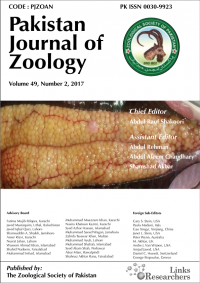Effect of Dietary Inclusion of Sodium Bicarbonate on Production Performance of Caged Layers During Summer
Effect of Dietary Inclusion of Sodium Bicarbonate on Production Performance of Caged Layers During Summer
Ghulam Abbas, Sultan Mahmood*, Ahsan ul Haq and Haq Nawaz
ABSTRACT
Effect of dietary inclusion of sodium bicarbonate on production performance of caged layers during summer was studied. One hundred sixty commercial layers (24 weeks old) were purchased from a poultry farm and were reared in a group for one week (adaptation period). At the start of 25th week of age, these layers were divided into 20 experimental units/replicates (8 layers/ replicate), which were further allotted to five treatment groups (4 replicate/ treatment). Five diets (A, B, C, D and E) were prepared with or without addition of sodium bicarbonate. Diet A, was without sodium bicarbonate and served as control whereas, diets B, C, D, and E contained 0.5, 1.0, 1.5 and 2.0% sodium bicarbonate, respectively. All the diets were iso-nitrogenous (CP 17%) and iso-caloric (ME 2700 Kcal/Kg) and were fed to the experimental birds ad libitum, for 12 weeks (26-37 weeks of age). Data on feed consumption, number of eggs produced, egg weight and egg mass laid by the birds were recorded. These data were used for the calculation of feed conversion ratios on the basis of per dozen eggs and per kg egg mass produced. Five eggs from each replicate were checked weekly for their shell thickness, yolk index, albumen index, haugh unit score, yolk pH, albumen pH, specific gravity and yolk cholesterol. The results revealed that dietary inclusion of sodium bicarbonate significantly (P<0.05) improved feed consumption, water intake, weight gain, egg production and feed efficiency of the birds. Addition of sodium bicarbonate significantly (P<0.05) increased egg weight, egg shell thickness and specific gravity of eggs produced by the birds. Yolk cholesterol was found to be the lowest in the eggs produced by the birds fed diets containing 1% NaHCO3. Whilst, pH of egg yolk and egg albumen were found to be significantly (P<0.05) higher in birds, which were fed diet containing 2% sodium bicarbonate. Respiration rate and rectal temperature was found to be lowered (P<0.05) by addition of sodium bicarbonate in the diet of layers. No mortality was observed in any group throughout the experiment.
To share on other social networks, click on any share button. What are these?









